外研版模块1-8册导学案课程纲要外研3
- 格式:doc
- 大小:96.00 KB
- 文档页数:6
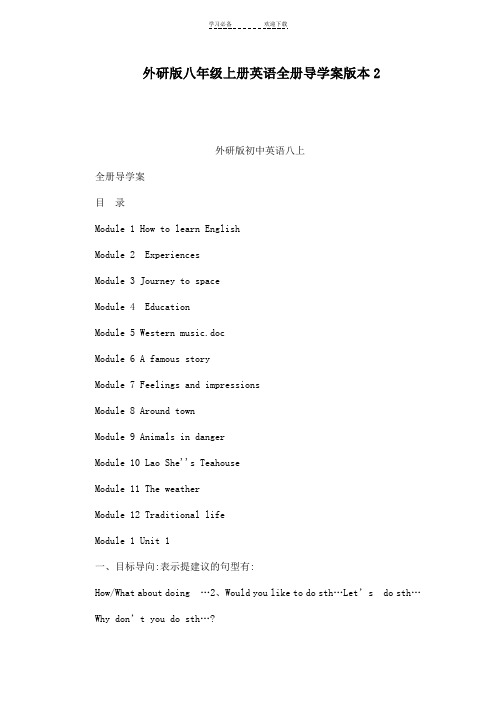
外研版八年级上册英语全册导学案版本2外研版初中英语八上全册导学案目录Module 1 How to learn EnglishModule 2 ExperiencesModule 3 Journey to spaceModule 4 EducationModule 5 Western music.docModule 6 A famous storyModule 7 Feelings and impressionsModule 8 Around townModule 9 Animals in dangerModule 10 Lao She''s TeahouseModule 11 The weatherModule 12 Traditional lifeModule 1 Unit 1一、目标导向:表示提建议的句型有:How/What about doing …2、Would you like to do sth…Let’s do sth…Why don’t you do sth…?Why not do st h…?6、You should/shouldn't do sth…7、It's a good idea to do sth二、自主尝试translation1. 为什么你不买些笔记本呢?2. 为什么你不听收音机呢?3. 为什么我们不纠正我们的错误呢?4. 老师应该帮助小朋友们过马路5. 贝蒂帮我学英语。
三、因势利导( Fill in the blanks)1 She shouldgo to school early2 Why don’t youplay basketball3 How about eat noodles?4 There are fivemistake in your homework5 She is going tohelp his father.6 It’s a good idea to get up early7 Heplay football very well8 My mother has sixpen friend.四、及时巩固translation1. Robin doesn’t speak Chinese so I’ll have to ________ 翻译.2. __________ 改正 the mistakes of your homework is very important.3. Can you ______ 重复 your questions?4. Make sure you give ____ 每个 word its right __________发音.5. Can you give me some ______ 建议 about buying a house?6. Who ___ 其他的 was at the party?7. I have two ______ 录音机.8. You’ve got some ________ 极好的 CDs here.9. He works in a province ________ 管弦乐队.10. 为什么你不把你的错的地方写在你的笔记本上呢?__________ you __________ the mistakes in your notebook?11. 把这篇文章翻译成英文怎么样呢?____________________ this writing into English?12. 不要尝试与坏人交朋友。

外研版高中英语必修3 全册导学案目录✧Module1Europe✧Module2 Developing and Developed Countries✧Module3The Violence of Nature✧Module4Sandstorms in Asia✧Module5Great People and Great Inventions of Ancient China ✧Module6Old and NewBook ⅢModule 1 EuropePeriodⅠFeb.Ⅰ. Lead-in: Something about Europe ( location; importance, climate; landform etc)1) Europe is the second smallest continent in the world. It lies to the west of Asia and on the east of the Atlantic Ocean. It is separated by the Mediterranean from Africa and north of Europe is the Arctic Ocean.2) Europe has been playing an important part in the history of the world. a) The Industrial Revolution started from England of Europe. b) The Renaissance started from Italy of Europe. c) Greece is the birth place of western civilization. d) Most of the countries in Europe are developed countries, esp. Western Europe, such as Britain, France, Germany, Italy etc. e) The European Union (including 25 countries) is an economic organization as well as a political one. All the countries in the Eu use the same money. They help each other when facing international affairs. People can live, work, study or travel in the countries without any special permit.3) The climate is warm and rainy all the year round in most part of Europe.4) The landform here is mainly plains.Ⅱ. Introduction.1. Complete the table with the words in the box (Part 1. P1)2. What do you know about the following cities?a) London: the capital of U.K which is famous for the tower of Londonb) Paris: capital city on the River Seine, the Eiffel Tower, Louvec) Rome: capital city of Italy (Rome was not built in one day/ All roads lead to Romed) Madrid: capital city of Spaine) Athens: capital city of Greece (the birthplace of the Olimpic Games)3. Do part 2 (P.1)Ⅲ. Reading and Vocabulary1. Match the photos with these descriptions. (Part 1. P. 2)2. Read the passage “Great European Cities” and do the following.①The main purpose of the passage is .A. to tell us some European cities and their characters.B. to describe some places of interest in EuropeC. to tell us some events buildings that influenced Europe in history.D. to tell us there are many great cities in Europe②The paragraph of Florence mainly tells us .A. many of Fl orence’s most beautiful paintings were drawn by Leonardo da Vinci.B. There were some greatest painters of all time in FlorenceC. Florence is famous for the renaissanceD. Millions of visitors go to see the Uffizi Palace.③Which of the flowing is true?A. Barcelona is the capital of Spain.B. The church of the Sagrada Facuilia was built in 1926C. The Uffizi Palace is a famous hotel in Florence.D. There were a lot of good writers in ancient Athens.④Which of the following is true auording to the passage?A. Athens was the world’s most powerful city two thousand five hundred years ago.B. Barcelona is the second largest city of Spain and is situated on the north west coast.C. Paris is one of the most beautiful cities in the world situated on the River Seine.D. More than eight million tourists come to visit Florence every year.⑤Which city is known as the birthplace of western civilization?A. BarcelonaB. ParisC. FlorenceD. Athens⑥What is one of Barcelona’s most famous landmarks?A. The Eiffel TowerB. the Church of the Sagrada Familia.C. The Uffizi PalaceD. The Parthenon on the Acropolis Hill.⑦From the passage we can infer that .A. Paris is larger than BarcelonaB. Athens was the world’s most powerful city two thousand, four hundred years ago becauseof its weaponsC. The Church of Sagrada Familia is famous because it was designed by Antonio GandiD. Visitors like to go to Paris because it is one of the most beautiful cities in the world.⑧Over two thousand years ago, if there had been a war among the cities of Paris, Bareelona,Florence and Athen; which do you think would have won the war? Athens (most powerful)⑨It is not true thatA. Madrid is about 500 kilometres west of Barcelona.B. The Louvra is situated on the Seine.C. The Renaissance ended in the 1700s.D. It took Gaudi 44 years to work on the Church of the Sagrada Familia.3. Do Exercise 3 and 4 (P. 3)Ⅳ. Homework: Fill in the boxModule 1 EuropePeriodⅡFeb.Ⅰ. Check the homework:1. France 法国, 法语French2. Spain 西班牙; 西班牙语Spanish3. Greek , 希腊Greece4. Italian 意大利语意大利Italy5. continent 大陆(洲) , continental (adj.)6. Europe 欧洲, European (adj.)Ⅱ.The language points.1. across / through / over ; across / cross横穿马路一定要当心啊. Do be careful when you go across the road. .那匹马跳过栅栏. The horse jumped over the fence.小偷是从窗户爬进来地. The thief came in through the window .2. S. + be / lie + in / on / to / off + 方位词S. + be located / situated in / on / to ……1)台湾在中国东南、福建东部。
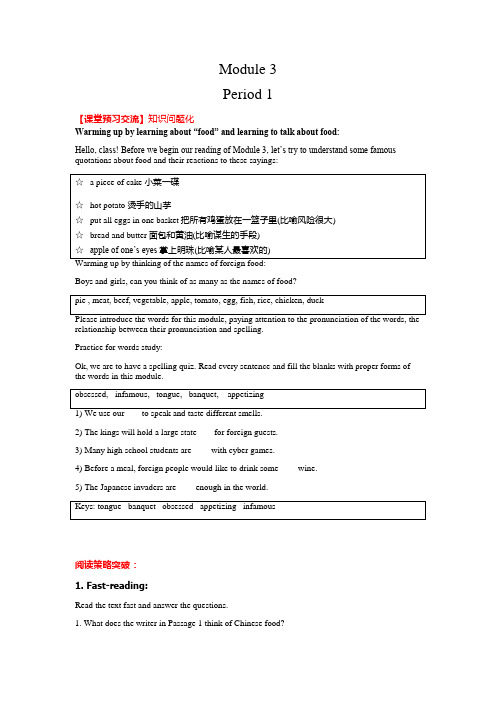
Module 3Period 1【课堂预习交流】知识问题化Warming up by learning about “food” and learning to talk about food:Hello, class! Before we begin our reading of Module 3, let’s try to understand some famous quotations about food and their reactions to these sayings:Boys and girls, can you think of as many as the names of food?relationship between their pronunciation and spelling.Practice for words study:Ok, we are to have a spelling quiz. Read every sentence and fill the blanks with proper forms of the words in this module.2) The kings will hold a large state____for foreign guests.3) Many high school students are____ with cyber games.4) Before a meal, foreign people would like to drink some____ wine.5) The Japanese invaders are____ enough in the world.阅读策略突破:1. Fast-reading:Read the text fast and answer the questions.1. What does the writer in Passage 1 think of Chinese food?He thinks Chinese people care about food and he has got used to most Chinese food.2. What does the writer of passage 2 think of British food?He doesn’t like the way British food is prepared and served but admire the polite manner in which British people eat.Careful Reading:Passage 11. What mistake did the writer make at the Chinese banquet?He thought the food first served was the total number of the dishes to be served and started eating greedily.2. What impressed the writer at the banquet?More dishes arrived, plus soups, side dishes, and desserts.3. What did the writer find shocking at first but then got use to eating?Almost every part of every animal, such as stomach, intestines, ears, tongue, tail, hoof and lungs. Passage24. What does the writer say about the appearance of food?At the counter there were colorful mixtures in eight or nine big boxes and it was quiet hard to make out what they contained.5. What does the writer think about eating cold food?He thinks cold food means poverty and should not be given to a guest.6. What does the writer think about the way British people eat?One thing he does admire is the polite manner in which British people eat, even if it is just a potato.DiscussAsk the students to discuss the following question.1. What is the difference between Chinese food and foreign food?2. Which do you prefer, Chinese food or British food?Chinese foodmany kinds of foodThey can eat whatever they getSense of beauty.foreign foodcold foodChoose whatever they wantThey mash food into an unrecognizable shapeText AnalysisA diagram of the readingPeriod 4 【课堂预习交流】知识问题化Warming up with questions.1. What do you know about Australia?Key: An island country in South Pacific.2. Do you know any of its cities?Key: Sydney3. What kind of animal lives in Australia?Key: Sheep, kangaroo, koala4. What food do people eat there?Key: Milk, beef, roast lamb, bacon, eggs, barbecue 5. Find more information about Australia?阅读策略突破:1. Fast readingRead the text and decide true or false.1. Nowadays, Australians have less meat.2. Australians don’t have much mutton.3. Cantonese and Beijing-style food is the most popular in Australia.4. People from America and Canada open grocery stores in Australia.5. Australians entertain their friend with the barbecue.Answers: TTFFT2. Careful reading1. What was the Australians’ diet not so long ago?They had milk and sugar, and eggs and bacon for breakfast, then roast lamb and beef for lunch or dinner.2. Why was the butcher one of the most important people in town?Because people ate a lot of meat every year. In the 1980s, each person consumed 39 kilograms of meat a year.3. What was the consequence of the diet?Many people were overweight.4. Are all Australians still eating so much meat as before?Recently, we have seen a gradual trend towards healthier food.5. What is modern Australian cooking like?It is often referred to as fusion cuisine, and the recipes include ingredients and cooking styles from the East and the West.6. What can you buy in the grocery stores?You can buy almost everything from different parts of the world.7. What’s the most important piece of equipment? Where is it?Barbecue. In the garden.8. How does the barbecue work?On a charcoal fire, people grill meat, such as slices of beef steak, chicken breasts or lamb cutlets.9. What do we know about the beer in Australia?The breweries which make beer are among the finest in the world.10. How do Australians use the word “barbecue”?They use the word for a popular way of entertaining friends.3. DiscussingAsk the students to talk about the following questions.What’s the difference between Chinese and Australian food?What are the similarities between them?What types of Australian food do you prefer?Get the students to write a description of the similarities and differences.4. Text analysis。
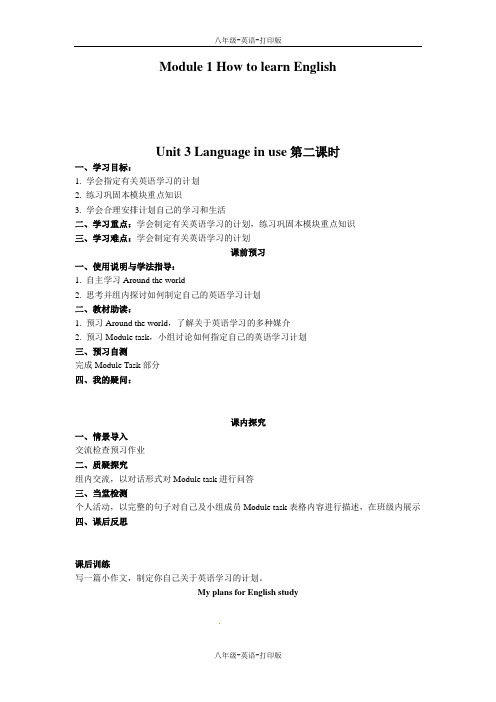
Module 1 How to learn EnglishUnit 3 Language in use第二课时一、学习目标:1. 学会指定有关英语学习的计划2. 练习巩固本模块重点知识3. 学会合理安排计划自己的学习和生活二、学习重点:学会制定有关英语学习的计划,练习巩固本模块重点知识三、学习难点:学会制定有关英语学习的计划课前预习一、使用说明与学法指导:1. 自主学习Around the world2. 思考并组内探讨如何制定自己的英语学习计划二、教材助读:1. 预习Around the world,了解关于英语学习的多种媒介2. 预习Module task,小组讨论如何指定自己的英语学习计划三、预习自测完成Module Task部分四、我的疑问:_____________________________________________________________________________ _____________________________________________________________________________课内探究一、情景导入交流检查预习作业二、质疑探究组内交流,以对话形式对Module task进行问答三、当堂检测个人活动,以完整的句子对自己及小组成员Module task表格内容进行描述,在班级内展示四、课后反思_____________________________________________________________________________ _____________________________________________________________________________课后训练写一篇小作文,制定你自己关于英语学习的计划。
My plans for English study_______________________________________________________________________________________________________________________________________________________________________________________________________________________________________ __________________________________________________________________________________________________________________________________________________________ _____________________________________________________________________________ _____________________________________________________________________________ _____________________________________________________________________________ ________________________________。
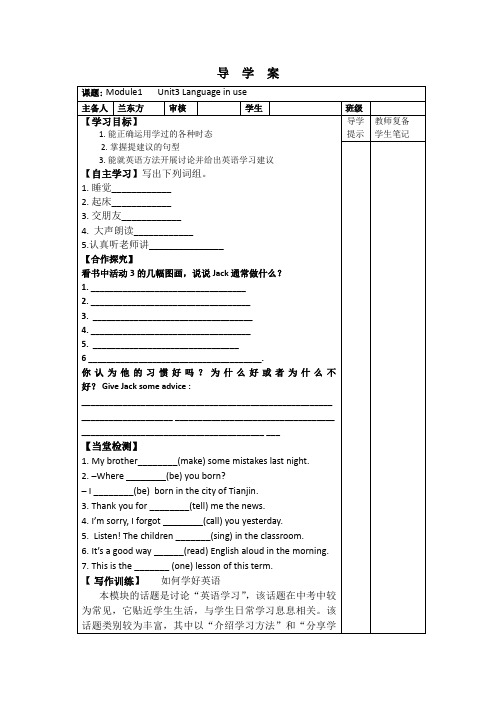
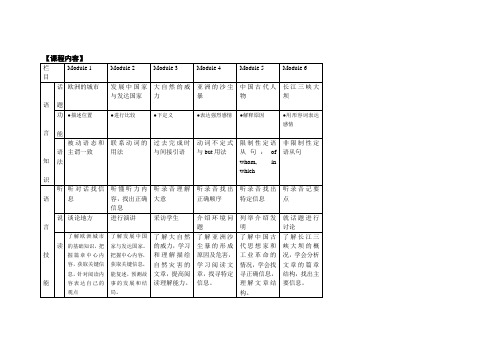
Module1 How to learn English一、教学内容:Unit1 Let’s try to speak English as much as possible.二、课型:Listening and speaking三、教学目标:1、能够正确使用下列单词和词组:dictionary, grammar, letter, look up, make amistake, understand等。
2、能够听懂讨论学习英语的方法和建议的对话。
3、能够谈论学习英语的问题并提出自己的建议。
四、教学重难点:能够运用本单元学习的词汇、句型谈论英语学习中的困难并提供建议。
五、教学准备:课堂整体运用任务型教学模式以及听说课“四个阶段”教学模式。
本课指导学生通过听录音获取对话信息,培养学生听力技能。
在教学过程中,采用多媒体手段辅助教学,利用各种图片和习题任务贯穿整个教学过程。
本节课需准备:PPT课件、挂图、录音机、课堂练习表格、奖品六、教学过程:七、板书设计:You should speak English as much as possible.Why don’t you write down the mistakes?How about listening to the English songs?达标训练题单项选择:1. Why not _____ off our mobile phones. The meeting will start in a minute.A. to turnB. turningC. turnD. turned2. ---I’ll fly to Kunming for my holiday for holiday this weekend.---Wonderful! __________.A. Not at allB. Have a good timeC. I hope soD. With pleasure3. --- Would you come back to have dinner with us this evening?--- I’d love to, ______ I have an important meeting .A. andB. orC. soD. but4. Tomorrow is my son’s ______ birthday, will you come to the birthday party?A. nineB. nineteenC. ninthD. the ninth5. ----Sally, could you give me some __________ on learning English ?----Of course . You 'd better get much listening practice.A. adviceB. newsC. giftsD. ways.6. -----________would you like ?----That 's all . Thank you.A. Else how.B. What else.C. How elseD. Else what7. How about ________our mistakes in red ink ?A. to correct.B. correcting.C. correctsD. correct.8. Peter , take your notebook out and ______ .A. write down it.B. write down them.C. write it down.D. write they down .9. ----Let' s go swimming . ---- !A. That' s a good idea.B. I ' m sorry to hear that.C. Best wishes .D. Have a good time.10. If you have some trouble, why ______you ask help from the police.A. notB. don’tC. doD. are.Module1 How to learn English一、教学内容:Unit 2 You should smile at her!二、课型:Reading and writing三、教学目标:1、能够正确使用下列单词和词组:advise、basic、conversation、improve、natural、meaning、suggest、should、ask for2、能够用should、advise、suggest等词汇提出自己的建议。
Module 1 How to learn EnglishUnit 3 Language in use第一课时一、学习目标:1. 复习并学会灵活运用本模块重点词汇和句型2. 稳固熟练运用本模块所学知识对有关英语学习的话题给别人提建议二、学习重点:通过复习稳固熟练运用本模块重点词汇和句型关于英语学习给别人提出建议三、学习难点:灵活运用本模块所学知识提出建议课前预习一、使用说明与学法指导:1. 自主复习Unit 1, 2的重点词汇和句型2. 熟背Unit 1的对话和Unit 2的文章, 有疑惑的地方用红笔标记并在组内探讨解决二、教材助读:1. 理解并熟读本单元Language practice局部的句子, 尝试总结有关提出建议的表达2. 自主学习课本语法局部关于本模块的知识三、预习自测(一) 回忆完成以下单词及短语:1 . 建议, 提议(名词)2 . 理解;明白3 . 拼写4 . 播送5 . 大声地6 . 改进, 改善7 . 应该8 . 理解;明白9. 害怕做某事10. 开始谈话11. 建议某人做某事12. 向……提出意见13. 对某人微笑14. 忘记做某事(二) 回忆总结提建议的句型:_____________________________________________________________________________ _____________________________________________________________________________ _____________________________________________________________________________ _____________________________________________________________________________ _____________________________________________________________________________ _____________________________________________________________________________四、我的疑问:_____________________________________________________________________________ _____________________________________________________________________________课内探究一、情景导入:借助Language practice中的句子回忆本模块重点二、质疑探究(一) 句型总结1. 回忆本模块所有提建议的句子2. 稳固提建议的句型_____________________________________________________________________________ _____________________________________________________________________________ _____________________________________________________________________________ _____________________________________________________________________________ __________________________________________________________________________________________________________________________________________________________(二) 逐步完本钱单元练习, 稳固词汇和句型的运用三、当堂检测(一) 单项选择( ) 1 . Don’t forget _________ me as soon as you arrive in Beijing.A . callingB . callsC . callD . to call( ) 2 . Write them _________ a piece of paper and put them in your bedroom.A . onB . toC . downD . back( ) 3 . She told us the good news with _________ smile ___________ her face.A . a ; inB . an ; inC . a ; onD . an ; on( ) 4 . Can you __________ it in English?A . speakB . sayC . talkD . tell( ) 5 . __________ natural to forget new words.A . ItB . ThatC . ThisD . It’s(二) 默写本模块关于提出建议的句子___________________________________________________________________________________________________________________________________________________________________________________________________________________________________________________________________________________________________________________________________________________________________________________________________________________________________________________________________________________________________________________________________________________________四、课后反思__________________________________________________________________________________________________________________________________________________________课后训练一、完形填空(10分)There is some 1 for you about learning English well. Firstly, it's a good way 2 your English 3 reading, so do more reading every day, but 4 try to translate every word when you read an English article. Secondly, do more listening exercises. You should repeat the sentences 5 you hear them. It's good 6 your pronunciation. Sometimes, we offer (提供) exercises to you to number the pictures, or find the mistakes in the sentences and then correct 7 . Thirdly, try to speak to foreigners. Don't be afraid of 8 mistakes. Take a deep breath and start a conversation with them. Always remember to enjoy yourself 9 English learning, 10 you will surely be good at it sooner or later.( ) 1.A. advice B.advices C.information D.ways( ) 2.A. improve B.to improve C.improves D.improving( ) 3.A. with B.in C.by D.at( ) 4.A. no B.not C.don't D.not to( ) 5.A. about B.before C.by D.when( ) 6.A. to B.with C.for D.at( ) 7.A. it B.them C.her D.his( ) 8.A. make B.making C.makes D.to make( ) 9.A. in B.at C.with D.by( ) 10.A. and B.or C.but D.finally(三) 阅读理解The best way of learning EnglishThe best way of learning a language is by using it. The best way of learning English is talking in English as muchas possible. Sometimes you will get your words mixed up and people will not understand you. Sometimes people will say things too quickly and you can't understand them. But if you keep your sense of humour, you can always have a good laugh at the mistakes. Don't be unhappy if people seem to be laughing at your mistakes .It is much better for people to be laughing at your mistakes than to be angry because they don't understand what you are saying. The most important rule for learning English is, “Don't be afraid of making mistakes; everyone make mistakes.〞( ) 1. The best way of learning a language is ______.A.to remember the grammar rules B.to use it as often as you canC.to try not to get your words mixed up D.to make a lot of mistakes( ) 2. When people laugh at your mistakes, ______.A.you should be angry B.you must stop talking at onceC.you should keep your sense of humour D.you must be very careful next time( ) 3. The most important rule for learning English is ______.A.to try to make fewer mistakes B.not to be afraid of making mistakesC.to be brave to talk to others in English D.both B and C( ) 4. Tom, Jerry, Bob and Mike are learning English. Who do you think is right?A.Tom tries to use English as much as possible.B.Jerry is always shy of speaking English.C.Bob is afraid that others may laugh at him.D.Mike never tries to talk to others in English.( ) 5.The passage seems to tell us ______.A.that you should learn to laugh at mistakesB.that it's interesting to learn EnglishC.what to do when you make mistakes while talking EnglishD.how to make others understand you第二课时一、学习目标:1. 学会指定有关英语学习的方案2. 练习稳固本模块重点知识3. 学会合理安排方案自己的学习和生活二、学习重点:学会制定有关英语学习的方案, 练习稳固本模块重点知识三、学习难点:学会制定有关英语学习的方案课前预习一、使用说明与学法指导:1. 自主学习Around the world2. 思考并组内探讨如何制定自己的英语学习方案二、教材助读:1. 预习Around the world, 了解关于英语学习的多种媒介2. 预习Module task, 小组讨论如何指定自己的英语学习方案三、预习自测完成Module Task局部四、我的疑问:__________________________________________________________________________________________________________________________________________________________课内探究一、情景导入交流检查预习作业二、质疑探究组内交流, 以对话形式对Module task进行问答三、当堂检测个人活动, 以完整的句子对自己及小组成员Module task表格内容进行描述, 在班级内展示四、课后反思_____________________________________________________________________________ _____________________________________________________________________________课后训练写一篇小作文, 制定你自己关于英语学习的方案.My plans for English study_____________________________________________________________________________ _____________________________________________________________________________ ________________________________________________________________________________________________________________________________________________________ ____________________________________________________________________________ _____________________________________________________________________________ _____________________________________________________________________________ _____________________________________________________________________________ 第一课时一、学习目标:1. 初步掌握本课重点词汇和句型2. 初步理解课文内容, 提高有关英语学习话题的听力技能3. 熟悉给别人提建议的方法二、学习重点:通过对话初步掌握给别人提建议的方法三、学习难点:理解并初步掌握对话中出现的提建议的各种句型课前预习一、使用说明与学法指导:1. 朗读并识记单词表中本课新词汇, 不会读的用红笔标记2. 试读听力局部的单词及课文对话, 初步理解对话, 不会读或不能理解的用红笔标记二、教材助读:1. 朗读并识记听力局部的单词并根据活动预测听力内容, 为听力扫除障碍2. 朗读并理解课文对话, 找出对话中提出建议的句子:_____________________________________________________________________________ _____________________________________________________________________________ _____________________________________________________________________________ _____________________________________________________________________________ 三、预习自测(一) 用英语读出并写出以下单词1 . 语法2 . 使完全3 . 句子4 . 改正5 . 拼写6 . 练习7 . 词典8 . 字母9 . 理解、明白10 . 建议11 . 应该12 . 发……的音13 . 大声地14 . 电台, 播送15 . 关键性的16 . 主要的17 . 极好的, 优秀的(二) 翻译以下短语, 并把它们背下来1 . 查阅, 查找2 . 犯错误3 . 写下, 记下4 . 同意某人5 . 需要做某事6 . 像……一样重要7. 联系做某事8. 给某人建议四、我的疑问:_____________________________________________________________________________ _____________________________________________________________________________课内探究一、情景导入:What does English include (包含)?How do you learn English?Do you have any advice for learning English well?二、洗耳运动完成听力局部三、逐步完成Listen and read及后面的练习四、质疑探究熟读以下句子, 组内相互练习, 并思考讨论其中包含的句子结构:1 . We should always speak English in class.2 . Let’s try to speak English as much as possible.3 . Why not write down the mistakes in our notebooks?4 . Don’t forget to write down the correct answers next to the mistakes.5 . It’s a good idea to spell and pr onounce new words aloud every day.6 . How about listening to the radio?7 . You just need to listen for key words and main ideas.]8 . Why don’t we try to find some English pen friends?五、当堂检测一、根据句意及汉语提示完成单词.1 . Could you please speak again ? I can’t u______________ you .2 . Li Mei __________________ (练习) speaking English every morning .3 . There are 26 l__________________ in English .4 . Let’s try to speak English as much as P__________________ .5 . ________________ (完成)the sentences with the correct form of the words .6 . Lin Shuhao is an ____________________ (优秀的) basketball player in NBA.7 . Could you tell me how to ____________________ (发音) the word ?8 . You should read English newspapers ___________________ (大声地) .9 . The ________________ (播送) says that it is going to rain tomorrow .10 . What’s the ___________________ (主要的) idea of this passage ?二、用所给词的适当形式填空.1.Why don’t you _________________ ( listen ) to the radio now ?2.What’s the Chinese _________________ ( mean ) of this word ?3.I’m sorry your _________________ ( spell ) is wrong again .4.Jack made a few __________________ ( mistake ) in the English exam .5.Little Tom wants to know the __________________ ( pronounce ) of this word .六、课后反思_____________________________________________________________________________ _____________________________________________________________________________课后训练一、单项选择( ) 1. Miss Liu gave us _________ about how to learn English.A . some advice B. some advices C. a good advice D. an advice ( ) 2. Here are some phone numbers. Please __________ in your notebook.A. write down themB. write them downC. write down itD. write it down( ) 3. If you don’t know the word, you can find its ____________ in the dictionary.A. translateB. to translateC. translatingD. translation ( ) 4. __________ make a birthday card for her?A. Why don’tB. How aboutC. Let’sD. Why not ( ) 5. __________ playing computer games?A. Why notB. Shall weC. How aboutD. Why don’t you ( ) 6. It’s bad for you to copy(抄袭) others’ homework . __________ do it again.A. Don’t tryB. Not try toC. Try not toD. Try not二、按要求完成以下各题.1 . Let’s read an English newspaper every day. (改为同义句)___________ __________ reading an English newspaper every day?2 . You should drink more water. (改为否认句)You ___________ ____________ drink more water.3 . Why don’t you walk to school? ( 改为同义句)____________ ______________ walk to school?4 . Spelling new words every day is a good idea. (改为同义句)____________ a good idea ___________ spell new words every day.5 . 我们应该相互帮助. (根据汉语提示完成句子)We ___________ help ____________ ____________.课后学习指导:仔细理解课文对话, 熟读并在组内分角色朗读第二课时一、学习目标:1. 熟练掌握本课重点词汇和句型2. 能听懂和理解与英语学习相关的话题3. 熟练掌握给别人提建议的方法二、学习重点:通过对话学会给别人提建议三、学习难点:通过对话学会给别人提建议课前预习一、使用说明与学法指导:1. 通过语音训练拓展日常交际用语2. 通过对话表演方式大胆开口, 能用英语进行有关英语学习话题的交流3、观察对话总结给别人提出建议的方法二、教材助读:1. 朗读并理解语音局部的句子, 注意语音语调2. 通过提示试着理解活动七的题意并思考该活动三、预习自测根据汉语提示翻译以下句子:1. 我们为什么不把他们写下来呢?________________________________________________2. 你应该及时(in time)纠正练习中的错误. __________________________________________3. 每天读英语报纸是一个好主意. _________________________________________________4. 经常检查你的词汇笔记本怎么样?______________________________________________5. 尽量不要将查阅每一个单词. ___________________________________________________6. 非常感谢, 托尼. ______________________________________________________________7. 玲玲经常帮助他的妈妈做家务. _________________________________________________8. 这是一个好主意. _____________________________________________________________9. 我们需要尽可能多地读英语报纸. _______________________________________________10. 别忘了每天听播送. __________________________________________________________四、我的疑问:__________________________________________________________________________________________________________________________________________________________课内探究一、情景导入思考:How can we give others some advice?二、按要求完成语音局部两个活动三、质疑探究(一) 通过本课的学习, 归纳运用以下句型结构, 并相互练习:1. Why don’t we / you …?2. We / You should …3. It’s a good idea to …4. How about …?5. Let’s try to …6. Don’t forget to ...(二) 知识要点探究1. Why don’t we try to fi nd some English pen friends? 我们为何不尽量找一些英国笔友呢?Why not write down the mistakes in our notebooks? 为何不在我们的笔记本里记下错误呢?1〕这里Why don’t we do…? 是用来表示提出某种建议, 而不是询问为什么不做某事的原因. 其简略形式为: Why not do…? 如:Why don’t you ask the teacher? = Why not ask the teache r? 为何不问问老师呢?2〕也可以用What about / How about…? 来提出建议, about为介词, 后接名词或动名词-ing形式. 如:What about taking little Tom along with us?3〕还可以用Would you like…? 来提出建议, 意为“你想要…吗?, would like 后可接名词或动词不定式. 如: Would you like a cup of tea? 你想要杯茶吗?Would you like to go and see her? 你想要去见她吗?牛刀小试:如果我们要提建议“我们去散步〞, 在英语中可有这几种表达法:____________________________________________________________________________________________________________________________________________________________________________________________________________________________________________________________________________________________________________________2. What else? 还有什么吗?else为形容词, 意为“别的;其他的〞, 一般放在特殊疑问词或不定代词的后面. 如:Who else did you see at the meeting? 你在会上还看到谁了?Dose anyone else want to read this book? 还有其他人想要看这本书吗?other也表示“其他的〞, 但只能用于修饰名词并放在名词前. 如:Did you see other classmates? 你看到其他同学了吗?They left early and other friends left late. 他们很早就离开了, 其他朋友离开得晚.牛刀小试:English is difficult for him, but nothing ________ is.对于他来说英语很难, 但其他没有什么是困难的.I will finish my homework first and then do ___________ things.我将首先完成家庭作业, 然后做其他事情.3. It’s a good idea to spell and pronounce new words aloud every day.每天大声拼读新词是一个好主意.句中it 是形式主语, 后面的动词不定式短语to spell and pronounce new words aloud every day是真正的主语.注意:在“ It is + adj.+ of / for sb. + to do sth.〞句型中, 假设形容词是描述不定式行为发出者的性格、品质的, 如:kind, good, nice, right, wrong, clever, careful, polite等, 介词用of;假设形容词仅仅是描述事物的特征, 如:difficult, easy, hard, important, dangerous等, 介词那么用for. 如:It’s very kind of you to help me. 你能帮我真好.It’s clever of you to finish the exercises so quickly. 你真聪明, 这么快就完成了这些联系.牛刀小试:It’s very dangerous _______ children to cross the busy street.对孩子来说, 穿过这条交通繁忙的街道是危险的.It’s difficult _______ us to finish th e work. 对我们来说, 完成这项工作很困难.It’s a good way ___________ down the new words. 记下新词是一个好方法.4. Let’s try to speak English as much as possible. 我们尽可能多地说英语吧.try to do sth. 表示“尽力/努力做某事〞. try (not )to do sth. 表示“尽力(不要)做某事〞. 如:类似的结构还有:ask sb. (not) to do sth. 叫某人〔不要〕做某事;tell sb. (not) to do sth. 告诉某人〔不要〕做某事.拓展:try还可以接动词的-ing形式表示“尝试、试图做某事〞. 如:You should try learning a new language. 你应该试试学一门新的语言.牛刀小试:翻译句子:这学期我们将努力学好所有学科. ______________________________________________Jack正在试着用筷子(chopsticks). ______________________________________________请告诉贝蒂不要等我. _______________________________________________________你叫丽莎买一份报纸了吗?__________________________________________________结构“as ... as possible〞表示“尽可能……〞, 相当于“as ... as sb. can / could〞.牛刀小试:Please write back ________ ________ ________ _________. 请尽快回信.Mrs Black gave me ________ ________ help ________ ________.布莱克夫人给予我尽可能多的帮助.Jane finished the work as quickly as possible. (转换同义句)Jane finished the work __________ __________ _________ __________ _________.四、当堂检测(一) 用单词的适当形式填空:1. The _____________ (spell) of the word is not right.2. It’s not a good idea to learn English by _______________ (translate).3. My grandfather always reads some _______________ (newspaper) before breakfast.4. There are all kinds of _____________ (radio). Which one do you like?5. The boy wasn’t careful and he made some ______________ (mistake) in his homework.(二) 用方框内适当单词的正确形式填空correct, match, term, message, excellent, number, orchestra1. Kat e said, “I should study hard this ____________.〞2. How about ____________ the right pictures with the letters?3. Could you please help me find out the ___________ spelling of this word?4. David is an ___________ student in our school ____________.5. My sister isn’t at home. Can I take a ____________ for you?五、课后反思_____________________________________________________________________________ _____________________________________________________________________________课后训练一、单项选择( ) 1 . Miss Liu gave us _________ about how to learn English.A . some adviceB . some advicesC . a good adviceD . an advice ( ) 2 . Here are some phone numbers, please __________ in your notebook.A . write down themB . write them downC . write down itD . write it down( ) 3 . If you don’t know the word , you can ____________ in the dictionary.A . look up itB . look after itC . look it upD . look for them ( ) 4 . __________ make a birthday card for her?A . Why don’tB . How aboutC . Let’sD . Why not ( ) 5 . Don’t forget _________ the door when you leave home.A . closeB . closedC . closingD . to close ( ) 6 . __________ playing computer games?A . Why notB . Shall weC . How aboutD . Why don’t you ( ) 7 . It’s better __________ early in the morning.A . startB . to startC . startingD . started ( ) 8 . I think English is as ___________ Chinese.A . important asB . important thanC . more important thanD . important ( ) 9 . It’s bad for you to copy others’ homework . __________ do it again.A . Don’t tryB . Not try toC . Try not toD . Try not ( ) 10 . It will be sunny soon. You don’t need __________ an umbrella .A . to takeB . takeC . takingD . took二、按要求完成以下各题.1 . Let’s read an English newspaper aloud. (改为同义句)___________ __________ reading an English newspaper aloud?2 . You should drink more water. (改为否认句)You ___________ ____________ drink more water.3 . It’s a good idea to write new words in groups.(对画线局部提问)___________ ____________ a good idea?4 . Why don’t you walk to school? ( 改为同义句)____________ ______________ walk to school?5 . Spelling new words every day is a good idea. (改为同义句)____________ a good idea ___________ spell new words every day.。
Module 2 Developing and Developed CountriesPeriod 1 Reading (Introduction, Reading and vocabulary)〖课程学习目标〗学习自主化1. To learn about the useful words, phrases and sentence patterns in this period;2. To grasp the main idea of the passage The Human Development Report and its general information;3. To know much about the developing and developed countries;4. To understand the long and difficult sentence patterns in the passage and use them freely;5. To know about what the most important development goals are;6. To know about the successful development of developing countries and understand the great difference in developing and developed countries , trying to study hard to do sth. for China’s development.〖课程导学建议〗导学规范化Teaching Aims:1. Knowledge and Skilla.Improve students’ ability of analyzing the given data and expressing their own opinion.b.Train the skills of scanning, fast reading and careful reading. Guess the meanings of the newwords according to the context.c.Learn how to use but, however and although, while. Write a short passage using these linkwords.d.Cultivate students’ logical thinking ability by making comparison.2.Emotion and Valuesa.Make comparison between developing and developed countries. Analyze the data and havethe students come to the conclusion that something must be done to help the poor.b.To encourage the Ss to be active and cooperative in the class3. Cross-cultural awareness:a.Understand the difference between developing countries and the developed country, andcarry on objective analysis to this kind of difference.b.Know the development of the world as well as China, stimulate their strong desire to buildtheir motherland a more powerful one.4. Character-building:a.To help them know the problems some developing countries are facing and cultivate theemotion of loving and careb.To let them know the importance of giving their hand to the poor.Difficulties and Importance:a. How to use but, however and although, while.b. How to analyze the given data and express their own opinion.c.Improve the student’s ability of grasping the general idea of the passage.Teaching Method:a.Task-based methodologymunicative Approach【自主预习】不看不讲【课堂预习交流】Step 1 representationAs we all know, there are two kinds of countries in the world; if the country is rich, we call it a developed country; if the country is poor, we call it a developing one. Now, what’s the difference between them? Let’s learn the text, the human development report will give the diff erence between them.Step 2 While-readinga.Skimming and ScanningRead the passage quickly and silently. Write the names of the countries below.Suggested answers:Step 3 DiscussionWe know there are lots of problems in some developing countries, they need our help, how should we help them?Discuss in a group of four, try to think of ways to help them. These topics may help you.When you enjoy your meal, remember lots of people are hungry;When you study, remember lots of children can not;When you enjoy yourself, remember lots of people suffer from diseases;When you live peacefully, remember lots of people suffer from the war.So let’s give our hand and help them. Then the world will become a better one.【课堂预习导学】Step 1: Warming up by defining The Human Development ReportHDR is an annual report launched by UNDP(United Nations Development Program联合国开发计划署) in 1990 to stimulate and inform global development debate. The world's 173 countries are ranked according to their level of human development. Usually every HDR focuses on some key issue such as democracy. Country by country assessment of trends towards achieving the UN MDGs (United Nations Millennium Development Goals联合国千年发展目标) is also given.Warming up by getting to know what human development isThe concept of human development focuses on the ends rather than the means of 'development' and progress. The real objective of development should be to create an enabling environment for people to enjoy long, healthy and creative lives. Though this may appear to be a simple truth, it is often forgotten in the immediate concern with the accumulation of commodities and wealth.Human development denotes both the process of widening people's choices and the level of their achieved well-being. The most critical ones are to lead a long and healthy life, to be educated, and to enjoy a decent standard of living. Additional choices include political freedom, guaranteedhuman rights and self respect. The concept distinguishes between two sides of human development. One is the formation of human capabilities, such as improved health or knowledge. The other is the use that people make of their acquired capabilities, for work or leisure.Step 2: Before you readPlease go over the word list for this module, paying attention to the pronunciation of the word, the relationship between its pronunciation and its spelling.Step 3 Detailed ReadingRead the text quickly and silently and find the answers to the questions.1.What did world leaders agree to do in 2000?2.What does the Human Development Index measure?3.What are the first two Development Goals?4.What progress have we made towards these goals?5.What do developed countries need to do?Suggested answers:1.147 world leaders agreed to work together to reduce poverty by 2015 or earlier.2.It measures a country’s achi evement in three ways: life expectancy, education andincome3.To reduce poverty and hunger, and ensure all children are educated up to the age of11.4.There are some examples of successful development, like in China, but more effort isneeded.5.They need to give more money.【新知学习】不议不讲1. Type of writing and summaries of The Human Development Report2. A diagram of The Human Development Report3. Complete the article with one word in each blankIn 2000, 147 world leaders agreed to cooperate to _1_ poverty by 2015 or earlier. From this agreement the Human Development Report is _2_. One of the most important parts of this report is the Human Development Index. _3_ Development Goals are listed in this report. The most important goals are to: Reduce _4_ and hunger; Make sure that all children have education up to the age of 11; Fight AIDS and other _5_; Improve the environment of poor people, e.g. make sure they have safe drinking water; _6_ developed countries to give more help to other countries. The 2003 Human Development Report _7_ example of successful development. For example, in nine years (1953-1962), __8___ increased life expectancy 13 years.4. Answer the reading comprehension questions according to the text1. In the year_____, 147 world leaders agreed to work together to reduce poverty by _____ or earlier.A. 2001, 2010B. 2000, 2015C. 2002, 2005D. 1995, 20002. Which of the followings are not included in the most important goals listed in the report?A. Reduce poverty and hungerB. Make sure that all children have education up to the age of 11C. Fight AIDS and other diseasesD. Get rid of all kinds of pollution3. Over half of those going hungry daily are in _____.A. North Asia and AfricaB. South Asia or AfricaC. South America and AfricaD. West Europe and South Asia4. The Netherlands, Norway and Sweden among the _____ richest countries in the worldA. fiveB. sixC. sevenD. eightStep 4: After you read1. C opy all the useful expressions into your Expression Book. If possible, make your own sentences with these expressions. You may as well write an article with these expressions.2. Read to transfer informationIn the Human Development Report you will find: Paragraph 1 telling about In 2000, The Human Development Report; Paragraph 2 telling about The Human Development Report Index; Paragraph 3 telling about Examples of successful developments; and Paragraph 4 telling about We need to make greater efforts.Step 5: Closing down by retelling the textTo end this period we shall try to retell the text in our own words with the help of the diagram above.【重点难点探究】重点单词【寓词于境】阅读下列句子,注意hunger的意思及用法。
Module 1 How to learn EnglishUnit 1 Try not to translate every word学习目标:1. 掌握学习英语的正确方法。
2. 学会用英语来向别人征求或提供建议。
学习任务:第一部分知识要点一、词汇:写出下列英文单词并朗读翻译v. ___________ n. ___________ 改正;纠正v.________将…...配对v. ____________ 给……标号码v. ____________重复v. __________ 语法n. ____________ 语音;发音v.______________写作;文章v.___________ 标点符号n. ____________ 拼写n. ___________ 学期n. ___________ 建议n. ____________ 错误n._____________笔记本n. ___________ 其他adj.& adv. ___________ 收音机n ___________ 报纸n. ___________ 信息;口信n. ____________ 每个;各个pron. __________ 其他的;不同的pron. __________ 卓越的;极好的adj. ___________管弦乐队n. __________二、习语: 阅读课文,找出下列汉语的英文表达。
欢迎回来_____________ 给你一些建议________________写下;记下____________在课上____________ 在…旁边___________尽力不要做某事/试着不要做某事________________________互相_____________ 做…是一个好主意___________________非常感谢______________ 举行音乐会________________帮助某人做某事__________________ 还有什么吗?_______________ 三、功能表达:你能从第二页对话中找出至少5种提建议的表达吗?__________________________ (Translate : 你应该…)__________________________ (Translate : 为什么不…?)__________________________ (Translate : …是一个好主意)__________________________ (Translate : …怎么样?)__________________________ (Translate : 尽力去做…/尽力不要去做…)你曾经还学过哪些提建议的表达?______________________________________________________________________________第二部分阅读理解一、阅读课本第二页对话,回答下面的问题。
课程纲要
高中“英语•必修3”是在高一上学期学习的基础上进一步培养学生的综合语言运用能力。
综合语言运用能力的形成是建立在语言知识、语言技能、情感态度、学习策略和文化意识等素养综合发展的基础上。
课程的实施必须以提升学生的语言知识、语言技能、情感态度、学习策略和文化意识等素养为目标,面向全体学生,为学生终身发展奠定共同基础。
本书通过对学生听、说、读、写等四项基本能力的训练以及对词汇和语法的学习和探讨研究,达到普通高中英语课程标准所要求的六级语言技能目标。
此模块属于必修模块,所有学生均应修习该模块。
学生在完成必修3学习后,词汇量应达到1,900—2,100,英语水平达到六级目标要求。
即达到以下要求:此模块要求学生进一步增强英语学习动机,有较强的自主学习意识。
能理解口头或书面材料中表达的观点,并简单发表自己的见解。
能有效地使用口头或书面语言描述个人经历。
能在教师的帮助下策划、组织和实施英语学习活动。
能主动利用多种教育资源进行学习。
能初步对学习过程和结果进行自我评价,调整学习目标和策略。
能体会交际中所使用语言的文化内涵和背景。
通过观察、体验、探究等积极主动的学习方法,充分发挥自己的学习潜能,形成有效的学习策略,提高自主学习的能力;学会运用多种媒体和信息资源,拓宽学习渠道,形成具有个性的学习方法和风格。
主动参与,积极观察、体验和感悟英语的表达,大胆类比、推测,通过自己的思考或与小组成员的合作,发现语言现象,归纳语言规律,从而将这些规律通过集中练习内化为自己的语言表达能力。
【课程目标】
在完成必修3学习后,词汇量有了一定的积累和提高,同时《普通高中英语课程标准(实验)》在听、说、读、写等四项基本语言能力要求方面都提出了新的目标要求。
具体如下:。